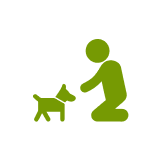Addressing obesity in dogs requires a combination of proper nutrition, regular exercise, and monitoring. Here are some solutions to help prevent and manage obesity in dogs:
-
Consult Your Veterinarian:
- Before implementing any changes, consult with your veterinarian to rule out any underlying health issues and determine a suitable weight loss plan.
-
Balanced Diet:
- Choose a high-quality, balanced dog food that is appropriate for your dog's age, size, and activity level.
- Measure food portions to avoid overfeeding, and follow feeding guidelines provided on the packaging.
-
Weight Management Dog Food:
- Consider specialized weight management or low-calorie dog food formulas that are designed to help dogs lose weight while still receiving essential nutrients.
- Vet Pro Obesity Dry Dog Food
- Vetlife Obesity Dry Dog Food
- Purina Proplan Weight Loss Dry Dog Food
-
Controlled Treats and Snacks:
- Limit treats and snacks, as they can contribute significantly to calorie intake.
- Opt for low-calorie treats or use small portions of regular treats.
-
Regular Exercise:
- Establish a regular exercise routine tailored to your dog's abilities and health status.
- Engage in activities like daily walks, playtime, or interactive games to promote physical activity.
-
Monitor Food Intake:
- Be mindful of table scraps and leftovers, as they can contribute to excess calorie consumption.
- Avoid feeding your dog human food that may be high in fats and sugars.
-
Slow Feeding Bowls:
- Consider using slow-feeding bowls to make mealtime last longer, promoting a feeling of fullness.
-
Weight Loss Programs:
- Some veterinary clinics offer weight loss programs with tailored diet plans and regular check-ups to monitor progress.
-
Hydration:
- Ensure your dog has access to fresh water at all times. Adequate hydration can support overall health and may help with weight management.
-
Regular Veterinary Check-ups:
- Schedule regular veterinary check-ups to monitor your dog's weight and overall health.
- Adjust the diet and exercise plan as needed based on your veterinarian's recommendations.
Remember, gradual and steady weight loss is healthier for dogs than rapid weight loss. It's essential to approach weight management with patience and consistency. Always consult with your veterinarian before making significant changes to your dog's diet or exercise routine, as individual needs may vary.





